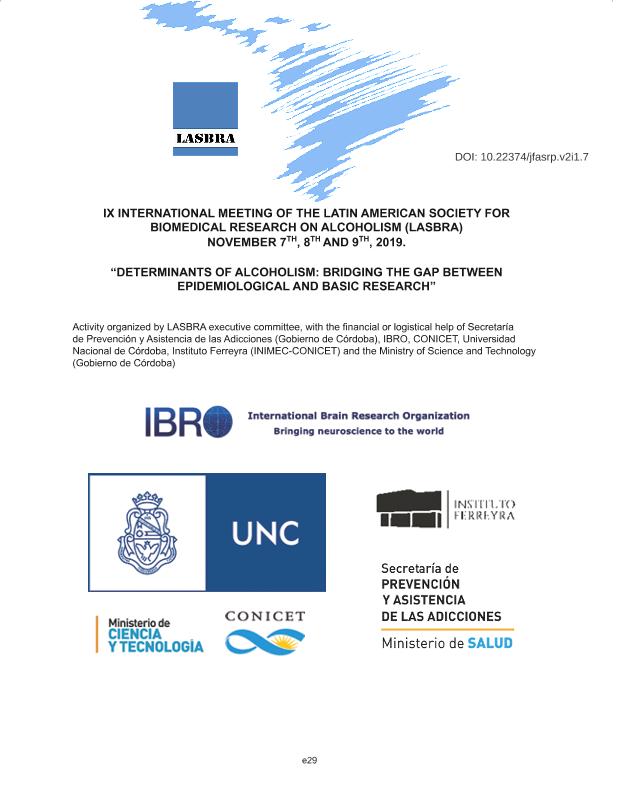Evento
Ethanol-Related Learning in Rat Neonates Impact upon Apneic Episodes and Promote Seeking Behavior of Stimuli that Signaled the State of Intoxication
D'aloisio, Génesis ; Anunziata, Florencia
; Anunziata, Florencia ; Acevedo, María Belén
; Acevedo, María Belén ; Macchione, Ana Fabiola
; Macchione, Ana Fabiola ; Molina, Juan Carlos
; Molina, Juan Carlos
 ; Anunziata, Florencia
; Anunziata, Florencia ; Acevedo, María Belén
; Acevedo, María Belén ; Macchione, Ana Fabiola
; Macchione, Ana Fabiola ; Molina, Juan Carlos
; Molina, Juan Carlos
Tipo del evento:
Encuentro
Nombre del evento:
IX LASBRA International Meeting; Latin American Society for Biomedical Research on Alcoholism
Fecha del evento:
07/11/2019
Institución Organizadora:
Latin American Society for Biomedical Research on Alcoholism;
Título de la revista:
Journal of Fetal Alcohol Spectrum Disorder
Editorial:
Dougmar Publishing Group
Idioma:
Inglés
Clasificación temática:
Resumen
In rats, high ethanol doses during early postnatal life exert deleterious effects upon brain development that impact on social and cognitive abilities. This stage in development partially overlaps with the 3rd human gestational trimester in terms of synaptogenesis. At this stage, human fetuses and rat neonates (postnatal days 3-9) exhibit relatively high respiratory rates that are affected by subteratogenic ethanol doses. Recent studies suggest conditioned breathing responses in the developing organism given explicit associations between exteroceptive stimuli and the state of EtOH intoxication. The present study was meant to analyze how apneic episodes are affected by the drug itself or through learning processes involving this psychotropic agent. During PDs 3, 5, 7 and 9 rats were subjected to differential experiences with salient tactile cues explicitly paired or not with the effects of vehicle or EtOH (2.0 g/kg) intragastric administration. A tactile discrimination paradigm applied during PDs 3, 5, 7 and 9 was conducted under stressful circumstances (maternal deprivation, exposure to a novel environment and drug administration procedure) for the developing organism. Pups were individually tested in a whole body plethysmograph where a given tactile cue was presented under the state of sobriety while an alternative texture was associated with the state of intoxication. Ethanol intoxication systematically inhibited the occurrence of apneic episodes. Most importantly, it was observed that tactile cues (either smooth or rough) systematically paired with ethanol intoxication also promoted inhibitory effects upon the emergence of apneas (isodirectional conditioned response). The study also revealed that ethanol also results in a sensitization process relative to its inhibitory effects upon apneic episodes. At PD11, pups were tested in a two-way tactile preference test defined by the textures previously experienced. This test revealed that ethanol intoxication increased preferences towards the stimuli that predicted such a toxic state. These last results may imply both the systematically reported positive reinforcing effects of ethanol during early ontogeny and/or its negative reinforcement capability in terms of antianxiety effects. As a whole these results emphasize the need to consider ethanol’s motivational effects during early development upon the regulation of breathing patterns and subsequent affinity for the drug.
Palabras clave:
ETHANOL
,
NEONATE
,
RESPIRATORY PLASTICITY
,
APNEA
,
ETOH'S REINFORCING EFFECTS
,
ANXIETY
Archivos asociados
Licencia
Identificadores
Colecciones
Eventos (IIPSI)
Eventos de INSTITUTO DE INVESTIGACIONES PSICOLOGICAS
Eventos de INSTITUTO DE INVESTIGACIONES PSICOLOGICAS
Citación
Ethanol-Related Learning in Rat Neonates Impact upon Apneic Episodes and Promote Seeking Behavior of Stimuli that Signaled the State of Intoxication; IX LASBRA International Meeting; Latin American Society for Biomedical Research on Alcoholism; Córdoba; Argentina; 2019; e42-e42
Compartir
Altmétricas



